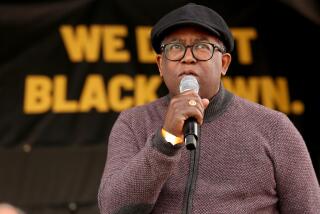Wright, Brown Did Not Violate State Law, Agency Says : Legislature: Fair Political Practices Commission finds the lawmakers’ intercession on behalf of Wright’s daughter--who received 27 traffic tickets--was not a conflict of interest.
- Share via
SACRAMENTO — The state Fair Political Practices Commission has determined that Assembly Speaker Willie Brown and Assemblywoman Cathie Wright did not violate state conflict-of-interest laws by interceding with local authorities regarding traffic tickets against Wright’s daughter.
Sandra Michioku, a spokeswoman for the political watchdog agency, said Monday that after reviewing a report by Ventura County Dist. Atty. Michael Bradbury that harshly criticized Brown (D-San Francisco) and Wright (R-Simi Valley), “there didn’t seem to be a basis for the commission to act.”
Bradbury’s report, issued in May, said Wright “demonstrated a clear pattern” of improperly intervening with local police and judges in an effort to keep her 24-year-old daughter, Victoria, from losing her license or going to jail as the result of 27 traffic citations--including 24 for speeding--she had received since 1981.
The report said that, among other things, Wright visited Ventura Municipal Judge Bruce A. Clark at his home to discuss two speeding tickets against Victoria then pending before the judge. She also asked Simi Valley police to void two other traffic citations.
However, Bradbury also found “no clear-cut criminal violations” that would warrant prosecution.
Bradbury forwarded his report to several state agencies, including the FPPC. He suggested that if Victoria lost her license, it would have been impossible or costly for her to get to her job. By helping her daughter keep her license, Bradbury said, the assemblywoman might have violated state laws that prohibit government officials from trying to influence decisions that affect a family member’s financial interests.
But in a letter to Wright, FPPC enforcement counsel Melodee A. Anderson said “there is insufficient evidence to establish that you violated the conflict of interest provisions” of the state’s Political Reform Act.
Moreover, she concluded, “there is insufficient evidence to establish” that Wright acted or purported to act as a representative of the Legislature when she communicated with various local officials about her daughter. Even if a conflict had been established, the FPPC’s enforcement power does not extend to conflicts involving elected state officials, the letter said. Although the conflict laws apply to state lawmakers, the Legislature exempted itself from penalties, an FPPC spokesman said.
Bradbury’s report also said that at Wright’s request, Brown telephoned a Ventura County judge hearing a traffic case against her daughter and asked for leniency. That act might have made Brown guilty of violating the same anti-conflict law, the district attorney said.
But in a letter to Brown, the commission said: “there is no evidence that indicates that you had any economic interest related to Victoria Wright’s traffic problems which would trigger a conflict of interest violation.”
After receiving the FPPC letter, Wright said in a statement she hopes Bradbury “thinks twice before publicly pointing fingers and making accusations that he can’t support with facts. Unfounded accusations and political witch hunts have no place in today’s political environment.”
Bradbury angrily retorted that Wright is “guilty as sin of misconduct” despite the FPPC ruling.
“She used her position and tried to fix tickets,” he said. “You don’t get to see a judge at home on Sunday if you’re Joe Citizen. If you’re Joe Citizen, your daughter doesn’t get 23 citations and continue to drive.”
The FPPC decision marked the third time a regulatory agency has declined to investigate or take action against Brown or Wright.
Last July, the State Bar said that after a 4 1/2-month inquiry, it had found no “compelling evidence” that Brown, a lawyer, violated rules governing attorneys’ conduct.
The Joint Legislative Ethics Committee decided not to investigate Wright, saying the allegations against her did not fall into its narrowly defined jurisdiction to look into potential conflicts of interests by lawmakers.
However, the state Commission on Judicial Performance in September publicly censured Judge Clark, charging he acted with “unusual lenience” toward Victoria Wright after meeting privately with her mother.
More to Read
Get the L.A. Times Politics newsletter
Deeply reported insights into legislation, politics and policy from Sacramento, Washington and beyond. In your inbox twice per week.
You may occasionally receive promotional content from the Los Angeles Times.










